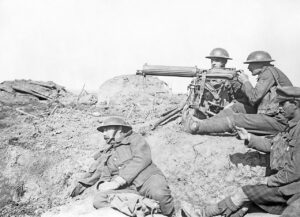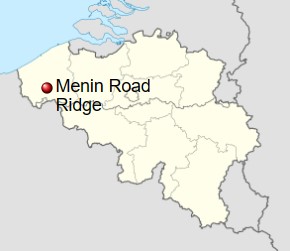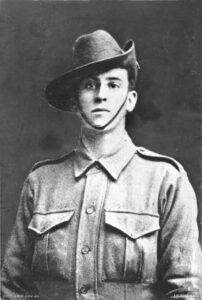 The dynamic of the world wars was probably different than most other wars…especially when it came to which units and countries were fighting side by side or against each other. When Britain declared war against Germany in August 1914, Australia was automatically also at war, because it was part of the British Empire. The New Zealand government (also under the sovereignty of the British Empire) followed without hesitation despite its geographic isolation and small population. The British Empire is for most of us, a difficult to understand group of countries that while largely independent, is also part of a larger government…the British Empire. The British Empire is a worldwide system of dependencies—colonies, protectorates, and other territories, that over a span of some three centuries was brought under the sovereignty of the crown of Great Britain and the administration of the British government. The policy of granting or recognizing significant degrees of self-government by dependencies, which was favored by the far-flung nature of the empire, led to the development by the 20th century of the notion of a “British Commonwealth” that was comprised of largely self-governing dependencies that acknowledged an increasingly symbolic British sovereignty. The term was embodied in statute in 1931. Today the Commonwealth includes former elements of the British Empire in a free association of sovereign states. Now, I don’t claim to understand the inner workings of the British Empire or the British Commonwealth, but Australia and New Zealand apparently had the option to join Britain in the war or to stand back and remain neutral. Both nations were loyal and joined Great Britain.
The dynamic of the world wars was probably different than most other wars…especially when it came to which units and countries were fighting side by side or against each other. When Britain declared war against Germany in August 1914, Australia was automatically also at war, because it was part of the British Empire. The New Zealand government (also under the sovereignty of the British Empire) followed without hesitation despite its geographic isolation and small population. The British Empire is for most of us, a difficult to understand group of countries that while largely independent, is also part of a larger government…the British Empire. The British Empire is a worldwide system of dependencies—colonies, protectorates, and other territories, that over a span of some three centuries was brought under the sovereignty of the crown of Great Britain and the administration of the British government. The policy of granting or recognizing significant degrees of self-government by dependencies, which was favored by the far-flung nature of the empire, led to the development by the 20th century of the notion of a “British Commonwealth” that was comprised of largely self-governing dependencies that acknowledged an increasingly symbolic British sovereignty. The term was embodied in statute in 1931. Today the Commonwealth includes former elements of the British Empire in a free association of sovereign states. Now, I don’t claim to understand the inner workings of the British Empire or the British Commonwealth, but Australia and New Zealand apparently had the option to join Britain in the war or to stand back and remain neutral. Both nations were loyal and joined Great Britain. 
The Australian 6th Battalion was sent into warfare just two months after WWI began in August 1914. They met up with and joined the New Zealand Army, becoming the ANZAC (Australian and New Zealand Army Corps) from April 1915, while maintaining status as the Australian 6th Battalion until the unit was evacuated in December 1915. The Australian 6th Battalion fought German troops on the Western Front alongside the Allies. They were a good battalion, but for most of the time, there were no major decorations awarded…until. in September 1917, while serving in Belgium, Lieutenant Frederick Birks was awarded the only Victoria Cross ever granted within the unit. Sadly, Birks was killed in action the following day.
The Victoria Cross (VC) is “the highest and most prestigious decoration of the British honors system. It is awarded for valor ‘in the presence of the enemy’ to members of the British Armed Forces and may be awarded posthumously.” On September 17th, Birks’ battalion was moving parallel to a German line, with the orders to attack and capture the German line and blow them up. The men began moving toward their positions from Zillebeke on the night of September 18th, and immediately came under fire from gas shells. September 19th found the men holding their line, while the battalion prepared to attack the German line the next day. The battle that ensued became known as the Battle of Menin Road. Masked by a “light drizzle” of rain at 4am on  September 20th, the Germans sent barrages in front of and behind the battalion’s position. The battalion began their advanced at 5:40am. Birks and a corporal met the first German resistance and took two machine-gun positions, as another group of officers rushed a strong post. The Germans attacked the group with bombs, seriously wounding the corporal. Birks had to continue on alone. Birks advanced to the rear of the pillbox and forced the occupants to surrender. Birks went on to lead an attack a series of dugouts and pillboxes on the edge of Glencorse Wood, and fought against machine gun and bombs. He also assisted in the reorganization and consolidation of Australian men who had drifted away from their unit. September 21st brought more enemy shelling in response to the movement of Allied artillery. The shelling buried some men in Birks’ platoon. Birks attempted to dig the men out, “standing exposed” in the effort, another shell aimed at the C Coy post killed Birks, and four others, before he could save them. For his actions at Ypres, Birks was posthumously awarded the Victoria Cross, the announcement was made on November 8, 1917.
September 20th, the Germans sent barrages in front of and behind the battalion’s position. The battalion began their advanced at 5:40am. Birks and a corporal met the first German resistance and took two machine-gun positions, as another group of officers rushed a strong post. The Germans attacked the group with bombs, seriously wounding the corporal. Birks had to continue on alone. Birks advanced to the rear of the pillbox and forced the occupants to surrender. Birks went on to lead an attack a series of dugouts and pillboxes on the edge of Glencorse Wood, and fought against machine gun and bombs. He also assisted in the reorganization and consolidation of Australian men who had drifted away from their unit. September 21st brought more enemy shelling in response to the movement of Allied artillery. The shelling buried some men in Birks’ platoon. Birks attempted to dig the men out, “standing exposed” in the effort, another shell aimed at the C Coy post killed Birks, and four others, before he could save them. For his actions at Ypres, Birks was posthumously awarded the Victoria Cross, the announcement was made on November 8, 1917.


Leave a Reply